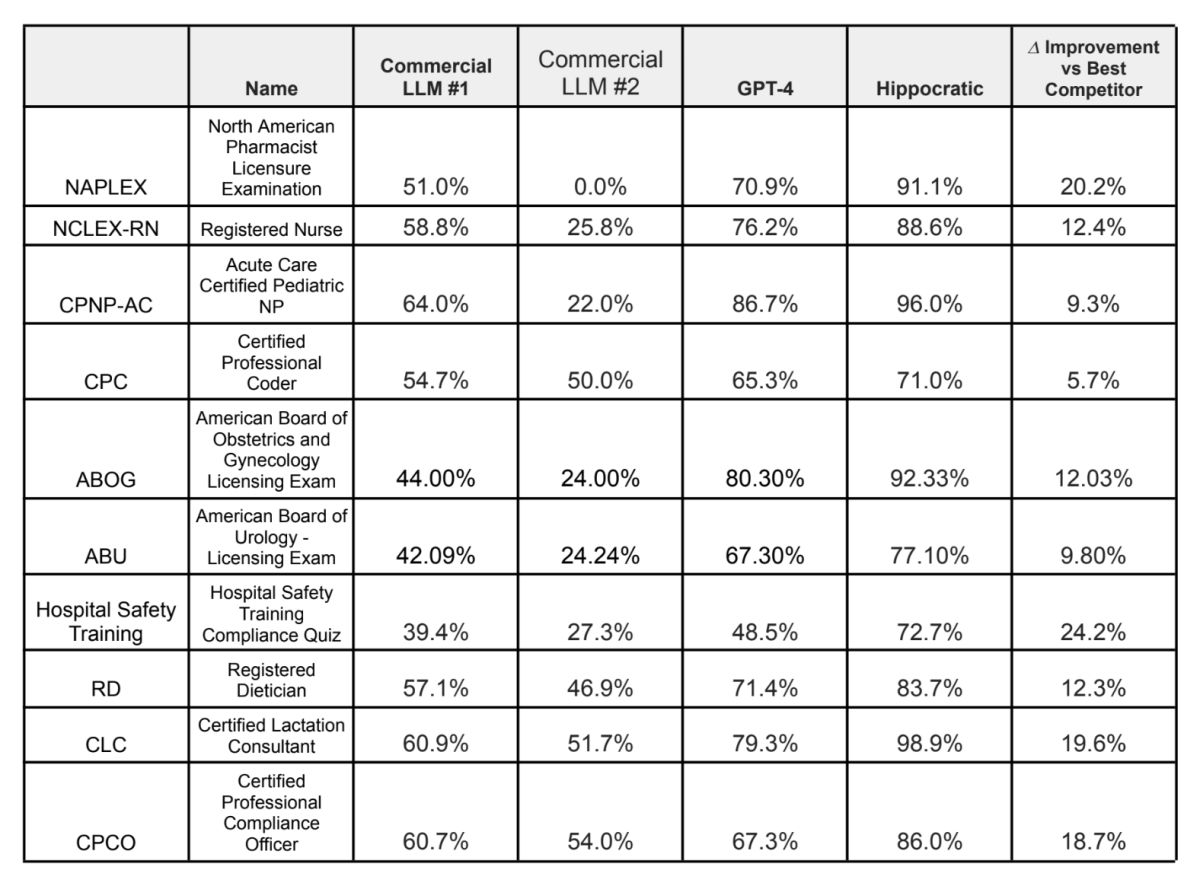Since ancient times, the name Hippocrates has been synonymous with the principles of ethical medical practice. The renowned Greek physician’s oath established a code of conduct that remains the bedrock of modern medicine. Fast forward to the present day, we see his legacy being carried forward in a form that Hippocrates himself could never have envisioned: an Artificial Intelligence model named Hippocratic AI. This specialized AI is poised to revolutionize healthcare, just as its namesake did millennia ago. Leveraging the power of machine learning and natural language processing, Hippocratic AI aims to enhance healthcare delivery, bridging gaps in accessibility and knowledge, and personalizing care. As we embrace this exciting new chapter in the evolution of medicine, we’re reminded that our journey from Hippocrates to Hippocratic AI reflects our relentless pursuit of innovation in the service of humanity.

What is Hippocratic AI:
Hippocratic AI is a startup that is building an artificial intelligence (AI) model for the healthcare industry. The company has raised $50 million in seed funding from investors including General Catalyst and Andreessen Horowitz.
The AI model is designed to help healthcare providers with a variety of tasks, including diagnosis, treatment planning, and patient education. Hippocratic AI says that its model is trained on a massive dataset of medical data, which allows it to provide more accurate and personalized care than traditional methods.
The company is still in its early stages, but it has the potential to revolutionize the healthcare industry. AI models have the potential to improve the accuracy, efficiency, and accessibility of healthcare. However, it is important to be aware of the potential risks associated with AI models. For example, AI models can be biased, and they can be used to make decisions that are not in the best interests of patients.
It is essential to carefully evaluate the safety and accuracy of AI models before they are used to make decisions about patient care. It is also important to consider the ethical implications of using AI models in healthcare. For example, how will AI models be used to collect and use patient data? How will AI models be used to make decisions about who gets access to healthcare?
These are important questions that need to be addressed before AI models can be widely adopted in healthcare. However, the potential benefits of AI models are significant, and Hippocratic AI is one of a number of companies that are working to develop safe and effective AI models for healthcare.
https://twitter.com/hippocratic_ai/status/1636095911192567809
How Hippocratic AI works:
Hippocratic AI’s model is trained on a massive dataset of medical data, including patient records, clinical trials, and medical literature. The model is then able to use this data to identify patterns and make predictions about patient health. For example, the model can be used to diagnose diseases, recommend treatments, and predict patient outcomes.
The model is also able to learn and adapt over time. As the model is exposed to more data, it becomes better at making predictions. This means that the model can be used to provide more accurate and personalized care over time.
Benefits of Hippocratic AI:
There are a number of potential benefits to using Hippocratic AI in healthcare. These benefits include:
- Improved accuracy: AI models can be trained on massive datasets of medical data, which can help them to identify patterns and make more accurate diagnoses than human doctors.
- Increased efficiency: AI models can automate many of the tasks that are currently performed by human doctors, which can free up doctors’ time to focus on more complex cases.
- Enhanced patient care: AI models can be used to provide personalized care to patients, which can help to improve patient outcomes.
Risks of Hippocratic AI:
There are also a number of potential risks associated with using Hippocratic AI in healthcare. These risks include:
- Bias: AI models can be biased, which means that they can make inaccurate or unfair predictions. This is a risk because it can lead to patients receiving incorrect or inadequate care.
- Misuse: AI models can be misused, which means that they can be used to make decisions that are not in the best interests of patients. This is a risk because it can lead to patients being harmed.
- Privacy: AI models can collect and use patient data, which means that there is a risk of patient privacy being compromised. This is a risk because it can lead to patients’ personal information being exposed to unauthorized individuals.
Hippocratic AI is a promising new technology that has the potential to revolutionize healthcare. However, it is important to be aware of the potential risks associated with AI models before they are widely adopted in healthcare. It is essential to carefully evaluate the safety and accuracy of AI models before they are used to make decisions about patient care. It is also important to consider the ethical implications of using AI models in healthcare.

Economic prospects and future growth of Hippocratic AI
Hippocratic AI, a promising start-up in the health tech sector, has recently secured a significant seed funding of $50 million, marking a substantial entry into the AI healthcare marketplace. The current valuation, although not disclosed, is expected to be substantial, given the sizable seed funding. Looking into the future, the value of Hippocratic AI is anticipated to grow exponentially, considering the escalating demand for AI-powered solutions in healthcare and the unique value proposition of a specialized large language model for the industry.
In comparison to other major AI models, Hippocratic AI stands out for its unique focus on healthcare. While companies like OpenAI with its GPT-3 have valuations skyrocketing into the billions, these platforms are more generalized, serving a broad range of sectors. Hippocratic AI’s specialized approach could potentially lead to a higher valuation, as healthcare is a sector with enormous potential for growth and investment.
Moreover, the increasing focus on personalized and predictive healthcare, combined with the ongoing digital transformation in the sector, sets the stage for companies like Hippocratic AI to flourish. It’s worth noting that the AI in healthcare market size is projected to reach $61.59 billion by 2027, growing at a CAGR of 41.4% from 2020 to 2027, according to Allied Market Research. With this trend, Hippocratic AI is strategically positioned to contribute significantly to this growth and potentially see its valuation rise correspondingly.
What does the future hold?
The future is full of possibilities. We can’t know for sure what the future holds, but we can make educated guesses based on the trends of today.
Some of the trends that are likely to shape the future include:
- The rise of artificial intelligence
- The growth of the internet of things
- The development of new energy sources
- The increasing importance of sustainability
- The need for global cooperation
These trends are all interconnected, and they will have a profound impact on the way we live, work, and play.
It is impossible to say for sure what the future will look like, but we can be sure that it will be a time of great change. We need to be prepared for this change, and we need to work together to create a better future for all.
Here are some questions to ponder as we think about the future of the Hippocratic AI:
- “Hippocratic AI is anticipated to have a transformative effect on healthcare services, but how will ethical and privacy issues be addressed?”
- “What potential does Hippocratic AI have to increase the accessibility and reach of healthcare services?”
- “How will the landscape of healthcare services be shaped by the increased use of Hippocratic AI in the future?”
- “What could be the advantages and limitations of Hippocratic AI compared to general AI technologies?”
- “How do you envision Hippocratic AI creating synergies with other technological advancements in the expanding field of digital health?”
The future is ours to shape. Let’s make it a good one.





